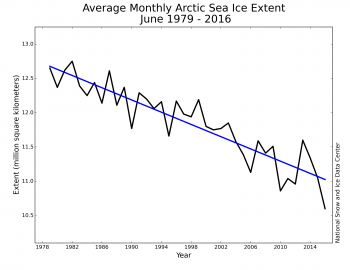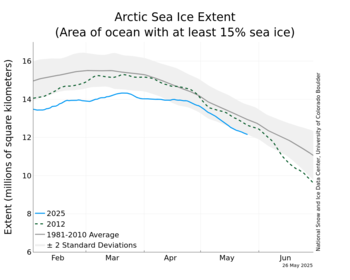http://nsidc.org/arcticseaicenews/
Arctic sea ice extent during June 2016 averaged 10.60 million square kilometers (4.09 million square miles), the lowest in the satellite record for the month. So far, March is the only month in 2016 that has not set a new record low for Arctic-wide sea ice extent (March 2016 was second lowest, just above 2015). June extent was 260,000 square kilometers (100,000 square miles) below the previous record set in 2010, and 1.36 million square kilometers (525,000 square miles) below the 1981 to 2010 long-term average.
So what are the chances of another broken record meltdown this summer? Its still too early to tell yet, spring and early summer ice melt are not necessarily correlated with low-ice extents in September (weather and sea conditions in July and August have an inordinately high effect on summer ice levels). But there is a better than average chance that the Perfect Meltstorm record of 2012 will be broken this year. If not, this year’s extent will certainly be very close to it. At any rate, since the satellites have been making observations (1979) the low ice record is broken about every four or five years. So we’re about due for another one. Here is this year’s June Arctic sea ice extent compared to past Junes in the satellite era.

The following graphic is a time series showing the YTD Arctic Ocean ice extent compared to the record 2012 year and to the averages and SDs of the entire dataset.
http://nsidc.org/data/seaice_index/images/daily_images/N_stddev_timeseries_thumb.png

Middle English
Svmer is icumen in
Lhude sing cuccu
Groweþ sed
and bloweþ med
and springþ þe wde nu
Sing cuccuAwe bleteþ after lomb
lhouþ after calue cu
Bulluc sterteþ
bucke uerteþmurie sing cuccu
Cuccu cuccu
Wel singes þu cuccu
ne swik þu nauer nuSing cuccu nu • Sing cuccu.
Sing cuccu • Sing cuccu nuModern English
Summer has arrived,
Sing loudly, cuckoo!
The seed is growing
And the meadow is blooming,
And the wood is coming into leaf now,
Sing, cuckoo!The ewe is bleating after her lamb,
The cow is lowing after her calf;
The bullock is prancing,
The billy-goat farting,Sing merrily, cuckoo!
Cuckoo, cuckoo,
You sing well, cuckoo,
Never stop now.Sing, cuckoo, now; sing, cuckoo;
Sing, cuckoo; sing, cuckoo, now!
Yeah I can hear that billy-goat contributing to the CO2 levels loud and clear.